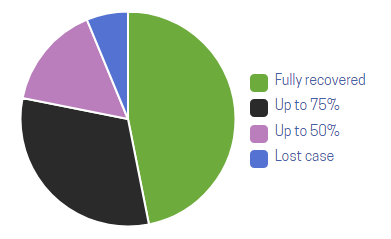BINARY OPTIONS SCAMS
These scams are unfortunately extremely common in the field of binary options. Dishonest brokers and reviews, or rigged robots and other auto trading services – the scams can come in many forms. So we feel it’s necessary to list the common known frauds and dishonest techniques in one place.
Our goal is to inform and to help you recover your lost funds from the banks and credit card providers through our extensive knowledge in fraud detection and years of experience in dealing with these matters. We have a professionally trained group of recovery agents who have worked in the financial sector and have a high success rate including many satisfied customers.
When any new financial instrument or form of trading first emerges, a whole range of businesses tend to get involved. It’s a fact of life that some of those product providers are going to be more trustworthy than others. This is certainly true of binary options. It is, after all, an accessible and popular method for individuals to trade the markets. What’s more, at least in their early days, binary options trading platforms tend to operate under the radar of the regulators and from any country over the internet – so it’s hardly surprising that unscrupulous operators seek to take advantage.

What exactly is a binary option? It’s a type of options contract in which the payout depends entirely on the outcome of a yes/no proposition, typically related to whether the price of a particular asset—like a stock or a commodity—will rise above or fall below a specified amount. Unlike regular stock options, with binary options you’re not being given the opportunity to actually buy a stock or a commodity—you’re just betting on whether its price will be above or below a certain amount by a certain time of the day.
For example, you expect the price of an individual stock will be above $80 at 3:30 p.m. today. So you buy a binary option that allows you to place this bet at a cost of $60. If at 3:30 p.m., the stock price is $80.01, your payout is $100, for a profit of $40. If the price of the stock at 3:30 is $79.99, you lose your $60. Of course, you can buy multiple binary options, which can significantly increase your winnings as well as your losses.
While some binary options are listed on registered exchanges or traded on a designated contract market and are subject to oversight by U.S. regulators like the Commodity Futures Trading Commission (CFTC), much of the binary options market operates through websites that don’t comply with U.S. regulations. And many of those unregulated websites are being used by criminals outside the U.S. as vehicles to commit fraud.
So where does the fraud come into it? The perpetrators behind many of the binary options websites, primarily criminals located overseas, are only interested in one thing taking your money. Fraudulent binary options website operators go to great lengths to recruit investors. They advertise their platforms often on social networking sites, various trading websites, message boards, and spam e-mail with big promises of easy money, low risk, and superior customer service. Potential investors are also cold-called from boiler room operations, where high-pressure salespeople use banks of phones to make as many calls as possible to offer “once-in-a-lifetime” opportunities.

REFUSAL TO CREDIT CUSTOMER ACCOUNTS OR
REIMBURSE FUNDS TO CUSTOMERS
These complaints typically involve customers who have deposited money into their binary options trading account and who are then encouraged by “brokers” over the telephone to deposit additional funds into the customer account. When customers later attempt to withdraw their original deposit or the return they have been promised, the trading platforms allegedly cancel customers’ withdrawal requests, refuse to credit their accounts, or ignore their telephone calls and emails.
IDENTITY THEFT
These complaints allege that certain Internet-based binary options trading platforms may be collecting customer information (including copies of customers’ credit cards, passports, and driver’s licenses) for unspecified uses. Do not provide personal data.
MANIPULATION OF SOFTWARE TO GENERATE LOSING TRADES
These complaints allege that the Internet-based binary options trading platforms manipulate the trading software to distort binary options prices and payouts. For example, when a customer’s trade is “winning,” the countdown to expiration is extended arbitrarily until the trade becomes a loss.
